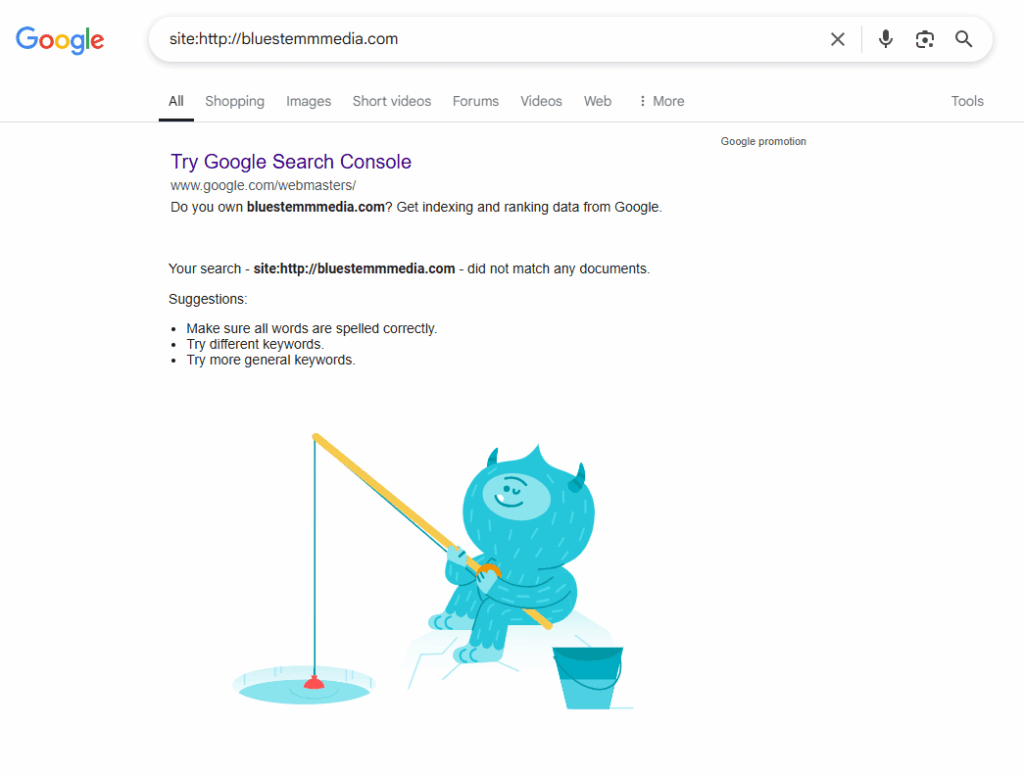Why Is My Website NOT Showing Up In Google?

You searched your business name or a term related to your business on Google.
You can’t find your website in the results. (Or they are buried on the 6th page of the search results)
There are two buckets this problem falls into:
My Website is NOT Displayed AT ALL in Google
If you can’t seem to find your website anywhere in Google, do the following test.
The Site Operator Test
Step 1: Copy the full URL string of your website. For example: https://bluestemmedia.com
Step 2: Open your browser and navigate to the Google search bar
Step 3: Type site: into the Google search bar and paste in your full URL (like this: site:https://bluestemmedia.com)

Step 4: Press Enter and see the results


If Google returns any results from your website, these are the pages that are indexed and can be found in Google. If Google returns nothing for your website, you cannot be found in Google. Make sure you double-check the spelling of your website during this test.
The true goal of the Site Operator test is to see if Google has indexed your website. If you have Search Console set up, you can see how many pages are indexed.
If your website is not showing up here, you are correct, your website is NOT showing up in Google.
Google Search Console is the #1 SEO tool we recommend for determining if a page is indexed. We have recorded a beginner’s guide to using Google Search Console, which walks you through the most important gauges and settings, and serves as a basic primer on how to use the tool. Check that out here:
What is indexing?
When a page is “indexed” by Google, it means they have added the page to their library of resources. If Google keeps you out of the library, it’s impossible to find the page through Google.
Google utilizes automated programs, often referred to as “spiders” or “crawlers,” to locate new and updated web pages. These crawlers navigate the web by following links from one page to another. After a page is crawled, Google analyzes its content to determine its subject matter, relevant keywords, and overall structure. This analysis includes examining text, images, videos, and other on-page elements. If the page meets Google’s quality and relevance criteria, it is added to Google’s index.
Troubleshooting a website that is NOT indexed in Google
The easiest fix is to talk to a website professional. BUT, there are a couple of technical troubleshooting steps you can take:
Check Your robots.txt File
This is a file on your website that tells search engine crawlers which pages they are allowed (or not allowed) to access. Sometimes, a misconfigured robots.txt file can inadvertently block Google from crawling your entire site.
- How to check: Type yourdomain.com/robots.txt (replace yourdomain.com with your actual domain) into your browser. Look for lines that say Disallow: / which would block everything.
- What to do: If you find a Disallow: / line that’s preventing indexing, you’ll need to edit this file. If you’re unsure how, consult your web developer or hosting provider.
Verify Your noindex Meta Tag
The noindex meta tag is a piece of code in your website’s HTML that specifically tells search engines not to index a particular page. While useful for pages you don’t want in search results (like login pages or thank you pages), it can sometimes be accidentally applied to your entire site.
- How to check: View the source code of your homepage (usually by right-clicking on the page and selecting “View Page Source” or “Inspect”). Search for <meta name=”robots” content=”noindex”> or similar variations.
- What to do: If this tag is present and shouldn’t be, it needs to be removed. This usually involves editing your website’s theme files or using an SEO plugin if you’re on a platform like WordPress.
Ensure Your Website is Accessible
Google can’t index your website if it can’t access it.
- Server Issues: Is your website consistently online? If your server is frequently down, Google’s crawlers might not be able to reach your site. Use a website uptime monitor to check this. Our go-to tool is Uptime Robot.
- Firewall Restrictions: Are there any firewall settings on your server or hosting that might be blocking Googlebot (Google’s crawler)?
- DNS Problems: If your domain name isn’t correctly pointing to your website’s server, Google won’t be able to find it. You can use online DNS checkers to verify this.
Submit a Sitemap to Google Search Console
A sitemap is like a table of contents for your website, listing all the pages you want Google to know about. Submitting it to Google Search Console helps Google discover and index your pages more efficiently.
How to do it: If you haven’t already, set up Google Search Console for your website. At Bluestem Media, we use Yoast SEO to generate our sitemaps. Navigate to “Sitemaps” in Search Console and submit the URL (usually yourdomain.com/sitemap.xml).
Check for Manual Actions
In rare cases, Google might have issued a manual action against your website due to spammy practices or violations of its quality guidelines. This can lead to your site being completely de-indexed.
How to check: Log in to Google Search Console and go to “Security & Manual Actions” > “Manual actions.” If there’s a manual action, Google will provide details on why it was issued and how to resolve it.
My Website is Not Showing Up for the Terms I Want
If you know Google has indexed the pages on your website (you can use the Site Operator Test further up in this article if you don’t know).
BUT, you are not showing up for the terms you would expect (for example, your business name is Red Dog Solutions, and you don’t show up for the term “red dog solutions”).
This is a search engine optimization (SEO) issue. Unfortunately, this topic is extremely extensive. I will give you a basic primer here to help you diagnose what type of SEO issue you may be experiencing.
I’m not showing up for my business name/brand name
Let’s say you are the owner of Red Dog Solutions, which is a local plumbing company. You’ve tried searching multiple variations of “red dog solutions”, “red dog”, and all of the top results are NOT your business website.
A few reasons why this might be the case:
- The term has a mixed “intent”. Some words or phrases have multiple meanings, and Google has to figure out what a user means. When a user types in “red dog”, Google likely assumes the user is looking for a photo of Clifford the Big Red Dog.
- The brand name is common. There might be quite a few businesses named “Red Dog” that are outranking you in Google. There might be a software company called “Red Dog” in Houston that is 10x bigger than your business, and thus, Google gives preference to their website.
- Your website was not built properly. A business or organization’s website homepage should show up for its brand name, at the very least. If points #1 and #2 don’t apply, you likely have a website that is poorly constructed. The developer or designer may not have used proper H1s, H2s, meta descriptions, or they may not have crafted the subpages to support the main home page.
Your website likely has large content and structural issues, which are preventing
I’m not showing up for terms related to my services or industry
Let’s say you are a solar installation business in Nashville called “Always Sunny”.
✓ You have a website
✓ You can find your website using your business name on Google
❌Your website doesn’t appear for “solar installation in Nashville”
The good news is, you are showing up for your brand name, which is a great first start. The bad news is, it’s going to take some work to rank for what we call “unbranded” terms in Google.
This is a VERY common problem, and is the entire reason we operate an SEO agency.
A few specific reasons why you might be having issues:
- The keyword is very competitive. “Solar installation in Nashville” is a highly sought-after term. Many other established solar companies are also trying to rank for this same phrase. Google aims to provide the most relevant and authoritative results, and if your website is new or hasn’t demonstrated enough authority, it will struggle to compete.
- Content relevance and depth issues. Google wants to rank pages that comprehensively answer a user’s query. If your page about “solar installation in Nashville” is thin on content, lacks details, or doesn’t cover related topics, Google might not see it as the best resource.
- You have low “website authority”. Google views website that have higher-quality backlinks (links from other reputable websites to yours) as more authoritative. If your website is new or lacks a strong backlink profile, it’s harder to compete with established players.
- Bad organization of content on the page: Even with great content, if Google can’t easily understand what your page is about, it won’t rank well. This refers to how you optimize individual pages for target keywords.
VERY IMPORTANT: There is an entire profession dedicated to the craft of getting a website. We happen to be in this profession (SEO). We highly recommend speaking with an SEO professional or SEO agency about this specific issue, as the learning curve for figuring out SEO issues and making progress on unbranded terms is significantly more difficult than for branded terms (like your business name). You do not have to go through us, but we would love to help you sort through these unbranded SEO ranking issues.
Final thoughts
Getting Google to work with your business website can be really frustrating. If your website isn’t showing up for the terms you need to show up for, it may be time to speak with a professional. Feel free to reach out to us here at Bluestem Media, and we will get on a free consulting call to look over your website issues.
Isaac Wiinanen
Isaac is an SEO Strategist & Web Project Lead for Bluestem Media. Focused on local SEO, Google Business Profile optimization, and StoryBrand marketing.

